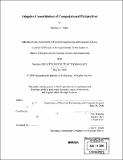Adaptive consolidation of computational perspectives
Author(s)
Sither, Matthew C. (Matthew Christian)
DownloadFull printable version (8.750Mb)
Other Contributors
Massachusetts Institute of Technology. Dept. of Electrical Engineering and Computer Science.
Advisor
Patrick H. Winston.
Terms of use
Metadata
Show full item recordAbstract
This thesis describes the design and implementation of machine learning algorithms and real-time recommendations within EWall, a software system used for individual and collaborative information management. In the EWall workspace, users collect and arrange cards, which are compact visual abstractions of information. A significant problem that often arises when humans try to collect information is information overload. Information overload refers to the state of having too much information, and it causes difficulty in discovering relevant information. When affected by information overload, the user loses focus and spends more time filtering out irrelevant information. This thesis first presents a simple solution that uses a set of algorithms that prioritize information. Based on the information the user is working with, the algorithms search for relevant information in a database by analyzing spatial, temporal, and collaborative relationships. A second, more adaptive solution uses agents that observe user behavior and learn to apply the prioritization algorithms more effectively. Adaptive agents help to prevent information overload by removing the burden of search and filter from the user, and they hasten the process of discovering interesting and relevant information.
Description
Thesis (M. Eng.)--Massachusetts Institute of Technology, Dept. of Electrical Engineering and Computer Science, 2006. Includes bibliographical references (p. 81).
Date issued
2006Department
Massachusetts Institute of Technology. Department of Electrical Engineering and Computer SciencePublisher
Massachusetts Institute of Technology
Keywords
Electrical Engineering and Computer Science.